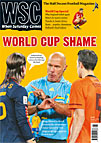 Tub-thumping one minute, critical the next. The English press switches from swagger to insecurity
Tub-thumping one minute, critical the next. The English press switches from swagger to insecurity
Wayne Rooney proved irresistible to the tabloids during the World Cup, with his features grafted onto a striking variety of cartoon characters, superheroes, animals and members of the Beatles. When not coloured green and depicted as Shrek, Wayne was gurning menacingly in front of a St George’s cross. Such excesses nothwithstanding, the tone of the England coverage was distinctly different to recent tournaments, albeit not until the games had started.
On the day of the US match, the Sun plumbed the depths with an exceptionally crass front page: Here’s hopin’ that England United shoot some totally awesome strikes past the goaltender in the soccerball world series today. Meanwhile, a grinning Steven Gerrard proclaimed See You In The Final from the back page of the Daily Express. The country was confident, apparently.
Of course, it didn’t turn out like that. After each dismal England performance the papers dallied with recrimination and far-reaching criticism before retreating into tub-thumping for the next game. But however optimistic they tried to sound it was never convincing. The same concerns kept cropping up, with every paper griping about the uncertain goalkeeping situation, exacerbated by Robert Green’s Hand Of Clod against the US. And as things started to unravel there was general grouching about Fabio Capello – his methods, decisions, personality, nationality and supposedly cruel treatment of the loyal adjutant Stuart Pearce. It took a very public “mutiny” by the even more disliked John Terry to restore some of the coach’s popularity.
The growing public antipathy towards star footballers will have been boosted by the players’ grumpy demeanour in South Africa as much as the abject performances. Much of this anger centred around Mr Photoshop himself, Wayne Rooney. His poor form and flaky temperament, especially on leaving the pitch after Algeria, was seen by the Independent as Goalless, Guileless and Graceless, while many pleaded for Rooney to “grow up”.
While England laboured, the tabloids’ favourite targets were looking set for a successful tournament despite an early defeat. Indeed, the only comfort the Sun could draw after the grim draw with Algeria was that “at least the Germans lost”. The Daily Express had promised We’re In Rush To Kick Out Germans in response to Franz Beckenbauer’s criticisms of England but as the last 16 tie approached there was a rising sense that defeat was inevitable.
Consequently, the anti-German rhetoric was much less strident than before.Historical reference points centred on defeat at Italia 1990 rather than victory in 1945. Pre-match tension was dominated by the prospect of a penalty shoot-out – the Sun promised Germans Wurst At Penalties – but thankfully steered clear of Blitzes and Fritzes. In the Express, Jim Holden admitted that “history favours the old foe” and that “looking for reasons why England might beat Germany is like looking for a ruby in a mountain of rocks”.
Several columnists rushed to compliment England’s opponents. In the Mail, Martin Samuel praised a blend of footballing cultures “born from a vibrant, inclusive Germany”, while the Mirror’s Michael Calvin fretted about German youth and English age – “This is no country for old men… We’re in danger of living in the past” – before presciently adding: “This [England] team may end up as part of the flotsam and jetsam of history.”
This sudden sense of perspective may be a sign of a thaw in the populist press’s attitudes towards Europe. More likely it was the realisation that no one could really see the present England team winning such a major game – it’s difficult to swagger when overwhelmed by insecurity. Some columnists sought reassurance in the notion that Capello’s team were better than Germany “man-for-man” – also a favourite line among the BBC pundits before the game – but this was a product of desperation, as the result proved.
Anger after the defeat was aimed equally at England’s players and coach; the country, we were told gravely, had been “let down”. But at least the blame was placed internally – it was the fault of underperforming Premier League millionaires rather than a Uruguayan referee and there were no reports of vandalised BMWs. Perhaps a more realistic and critical appraisal of where English football now stands will come out of the national team’s dreadful World Cup. But let’s not get carried away. The “best league in the world” returns in less than a month. Ed Upright
From WSC 282 August 2010